The German orthography reform of 1996 was a change to German spelling and punctuation that was intended to simplify German orthography and thus to make it easier to learn, without substantially changing the rules familiar to users of the language.
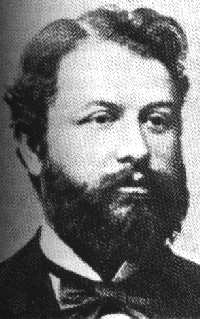
Georg Jellinek was an Austrian public lawyer and was considered to be "the exponent of public law in Austria“.
Otfried Höffe is a German philosopher and professor.

Gerhard Anschütz was a noted German teacher of constitutional law and the leading commentator of the Weimar Constitution. His principal work is the two-volume legal encyclopedia Handbuch des deutschen Staatsrechts; his constitutional commentary saw 14 editions during the Weimar Republic.
Eckhard Jesse is a German political scientist. He held the chair for "political systems and political institutions" at the Technical University of Chemnitz from 1993 to 2014. Jesse is one of the best known German political scholars in the field of extremism and terrorism studies. He has also specialized in the study of German political parties and the German political system.

René Schickele was a German-French writer, essayist and translator.

The Südkurier is a regional daily newspaper in Germany serving the regions northwest of Lake Constance, Hochrhein and Black Forest with its headquarters Konstanz, Germany. The paper appears with a circulation of around 130,000, six times per week in Berliner format. The predecessor of the Südkurier was the Konstanzer Zeitung.
Otto Pöggeler was a German philosopher. He specialized in phenomenology and commenting on Heidegger. In 1963 he authored the acclaimed Martin Heidegger’s Path of Thinking, one of the first rigorous attempts at tracing the development of Heidegger’s thought. He also published a study of poetry of Paul Celan, and was director of the Hegel-Archiv at the Ruhr University in Bochum.
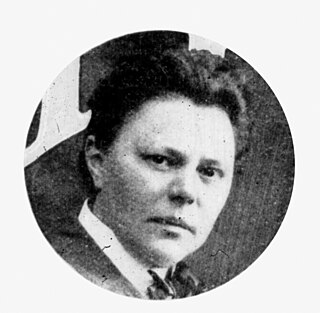
Johanna Elberskirchen was a feminist writer and activist for the rights of women, gays and lesbians as well as blue-collar workers. She published books on women's sexuality and health among other topics. Her last known public appearance was in 1930 in Vienna, where she gave a talk at a conference organised by the World League for Sexual Reform. She was open about her own homosexuality which made her a somewhat exceptional figure in the feminist movement of her time. Her career as an activist was ended in 1933, when the Nazi Party rose to power. There is no public record of a funeral but witnesses report that Elberskirchen's urn was secretly put into the grave of Hildegard Moniac, who had been her life partner.

Helmut Müller-Enbergs is a German political scientist who has written extensively on the Stasi and related aspects of the German Democratic Republic's history.
Wolfgang Burandt is a German lawyer, mediator, legal academic and professor for commercial law at the Nordakademie - Graduate School.

Johannes Stroux was a German classicist, scholar of Roman law and organizer of scientific projects and organizations. In 1945 he became rector of the Berlin University and president of the Berlin Academy of Science.
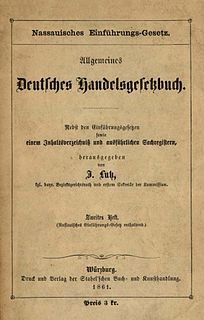
The Allgemeines Deutsches Handelsgesetzbuch was the first comprehensive commercial code in Germany. The term "Allgemein" (General) emphasized the whole German Confederation as the scope of application.

MaRisk is an acronym referring to the minimum requirements for risk management, a circular by the German Federal Financial Supervisory Authority providing concepts for risk management of banks, insurances and other companies financially trading in Germany. The primary legal background for MaRisk is the Kreditwesengesetz (KWG), the secondary legal background is the Solvabilitätsverordnung SolvV.
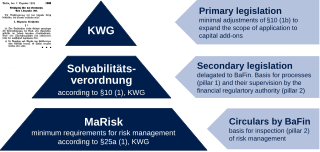
SolvV is short for Solvabilitätsverordnung which means solvability directive in German, i.e. the delegated legislation of §§ 10 ff of the Kreditwesengesetz and in effect since 2006. The long name in German is Verordnung über die angemessene Eigenmittelausstattung von Instituten, Institutsgruppen und Finanzholding-Gruppen, literally "directive on the appropriate setting of equity for (financial) institutes, groups of institutes and financial holding groups". There is an analogous directive with the same name in Austria.
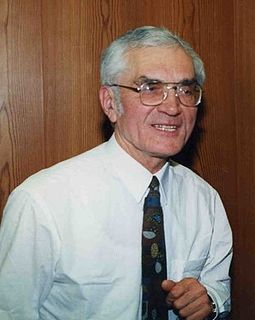
Content in this edit is translated from the existing German Wikipedia article at de:Michael Roth (Kybernetiker); see its history for attribution.

Spiros Simitis is an internationally recognised German jurist and a pioneer in the field of data protection. In recognition of his role, admirers sometimes describe him as "the man who invented data protection".
German youth language or Youth Communication describes the linguistic patterns and characteristics used by German adolescents. Speech patterns vary by age, era, and location.

Klaus von See was a German philologist who specialized in Germanic studies.
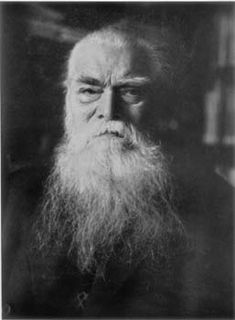
Karl Konrad Ferdinand Maria von Amira was a German jurist who served as Professor of Constitutional Law at the Ludwig Maximilian University of Munich. He was a known expert on early Germanic law.
This page is based on this
Wikipedia article Text is available under the
CC BY-SA 4.0 license; additional terms may apply.
Images, videos and audio are available under their respective licenses.














